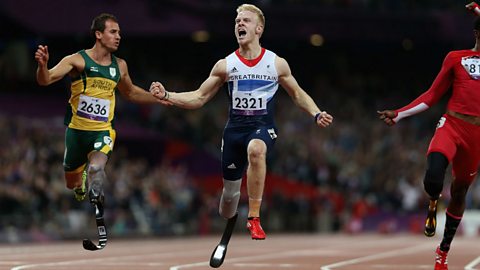Athlete performance
Technology is used to enhance athletes' performances at all stages – before, during and after events. It may be used by the athletes' support teams, such as coaches, medics and technicians, as well as by the athletes themselves. For example:
- health, wellbeing and fitness:
- wearable devices track performers' cardiovascular rates
- hyperbaric oxygen therapyA medical treatment that supports the body's natural healing processes through the inhalation of 100% oxygen. aids recovery after injury
- technique and tactics:
- performance analysis software shows body movements in slow motion
- game analysis software tracks team, ball and opposition movements
- equipment:
- cambered wheelsThe tilt of a wheel is known as the camber. Wheelchairs for sport often have tilted wheels for greater stability. on wheelchair basketball chairs improve turning
- smaller, turbo engines in Formula 1 cars are more fuel efficient
- clothing and footwear:
- cricket helmets are lighter, better ventilated and more affordable
- track shoes are lighter and have greater grip for cornering
- facilities and playing surfaces:
- fourth generation (4G) pitches can be used whatever the weather, all year
- artificial snow allows winter sports to take place anywhere in the world
Blade runners

A running blade is a prosthetic An artifical device that replaces a missing body part, often a limb, eg an artificial leg. leg that transfers energy created by the runner on to the track. It consists of a customised socket that fits the athlete's stump, a knee joint and a carbon fibre running blade. The blades reproduce the action of the ball of the foot during running. They are fitted with spikes to increase friction with the track.
The blades were first designed in the 1970s but have developed enormously and can cost £5,000. Athletes may use one or two blades depending on whether they are a single or double amputeeSomeone who is missing one or more limbs, either through injury or birth. and blade lengths differ to suit each athlete. The International Paralympic Committee measures all blades before competition to ensure athletes do not have an unfair advantage but there is still some controversy over blade lengths.
Technology plays an important part in monitoring and analysing the performance of athletes, identifying their strengths and areas for improvement, as well as their fitness. Technology is also used for collecting and analysing data, which can help to improve fitness, improve skills, prevent injuries, and help to win matches by adopting a different strategy.
See also Observing and analysing performance.